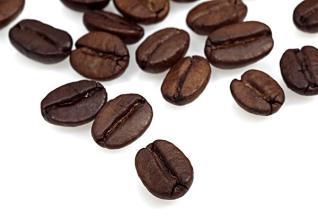Brazilian yellow bourbon suitable for grinding thick and thin queen manor coffee bean flavor description
Brazilian yellow bourbon suitable for grinding thick and thin queen manor coffee bean flavor description
Cerrado is a growing area where Cerrado coffee beans are treated with the traditional Brazilian natural drying of pulp (Pulped Natural); since coffee beans are dried with peel pulp (Pulp) and pectin (Mucilage), they retain high organic, mineral and soluble solids.
This kind of coffee bean has a strong aroma, slightly sweet with the flavor of Chocolate, as well as the sour taste of citric acid, which is not easy to detect. It has a moderate taste (Body) and a long Aftertaste or Finish.
The Brazilian grading system, which scores the proportion, size, flavor and taste of defects, is its own independent grading system, which is more complex than that from other countries. For example, the "Brasil Santos NY2 SC17/18 SS FC" NY2 classifies the proportion of defects: the higher the number, the greater the proportion of defects. The order is 2, 2, 3, 3, 3, 4... NY says it is based on the New York rating standard. SC 17A 18 represents the number of coffee beans. While SS FC (Strictly Soft and Fine Cup) represents flavor and taste, it is divided into two groups: first Strictly Soft, Soft, Softish, Hard, Hardish, Rioy/Rioysh, Rio second is Fine Cup and Good cup. Brazilian coffee has the characteristics of high sweetness, dryness, softness and low acid value. It has a wide range of uses and is generally loved.
Coffee is now cultivated in new places inland, thanks to natural benefits. Panama became famous after the war as a new coffee producer in Brazil, and because its natural conditions are not superior, it is still inferior in quality compared with that produced in Sao Paulo. Now in the northern part of the state of Sao Paulo, Riberon, Bredo, and Franka, the interior of Mogianashi is the best producer of Brazilian coffee.
Brazil is the world's largest coffee exporter, known as the "coffee kingdom" title. In the past 40 years, the trade volume of Brazilian coffee beans and instant coffee has averaged US $1.38 billion a year. In 2002, the total volume of world coffee trade was 88.7 million bags, and Brazil exported 27.99 million bags, an increase of 19.3% over 2001, accounting for 30% of the world coffee trade volume, ranking first (the second is Vietnam, with 12.2 million bags, accounting for 13.7%), an increase of nearly 8 percentage points over the 22.3% in 1998. Europe is the largest buyer of Brazilian coffee, accounting for 50 per cent of Brazilian exports. In 2002, coffee exports to EC countries reached US $708.7 million, accounting for 52.3 per cent, with most of the rest sold to the United States and Asia. Coffee beans account for 85% of Brazil's coffee exports.

Important Notice :
前街咖啡 FrontStreet Coffee has moved to new addredd:
FrontStreet Coffee Address: 315,Donghua East Road,GuangZhou
Tel:020 38364473
- Prev

The Burman Manor in Kenya, which is famous for its rich aroma and balanced acidity.
World-famous for its rich aroma and balanced acidity, the Kenyan Berman Manor introduces high-quality Kenyan coffee with a rich, fruity flavor and a rich and perfect taste. Kenyan coffee has a wonderful fruit flavor, tastes like BlackBerry and grapefruit, and is a favorite of many coffee gluttons. This coffee has an excellent medium purity, crisp and refreshing mouth
- Next

The graded taste of Honduran coffee
A brief introduction to the production area of Honduran Coffee grading and Grinding scale; High-quality coffee in Honduras uses a washing method to treat coffee beans, usually after soaking, when the defective fruit will surface, and then it can flow away and discard it first. Then put the good fruit into the fruit peeling machine and peel off the peel with the rotating force of the machine. Peeled fruit in
Related
- Does Rose Summer choose Blue, Green or Red? Detailed explanation of Rose Summer Coffee plots and Classification in Panamanian Jade Manor
- What is the difference between the origin, producing area, processing plant, cooperative and manor of coffee beans?
- How fine does the espresso powder fit? how to grind the espresso?
- Sca coffee roasting degree color card coffee roasting degree 8 roasting color values what do you mean?
- The practice of lattes: how to make lattes at home
- Introduction to Indonesian Fine Coffee beans-- Java Coffee producing area of Indonesian Arabica Coffee
- How much will the flavor of light and medium roasted rose summer be expressed? What baking level is rose summer suitable for?
- Introduction to the characteristics of washing, sun-drying or wet-planing coffee commonly used in Mantenin, Indonesia
- Price characteristics of Arabica Coffee Bean Starbucks introduction to Manning Coffee Bean Taste producing area Variety Manor
- What is the authentic Yega flavor? What are the flavor characteristics of the really excellent Yejasuffi coffee beans?

